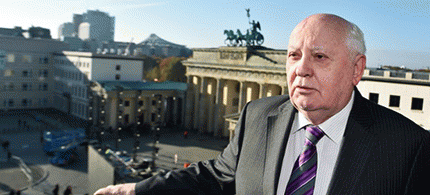Reprinted from Reader Supported New
"The world is on the brink of a new Cold War," a surprisingly animated Mikhail Gorbachev warned in Berlin on Sunday. "Some are even saying that it's already begun."
Speaking at a symposium celebrating the 25th anniversary of the fall of the Berlin Wall, the 83-year-old Gorbachev may seem yesterday's man. He is, after all, the last president of the Soviet Union before it fell apart, while Russia has now morphed into the corrupt oligarchic capitalism of Vladimir Putin, with his new-found religiosity, idiotic gay-bashing, and ultra-rightwing nationalism.
In today's Russia, Gorby remains a prophet without honor in his own country, where members of parliament have called on their government to prosecute him for treason for having sold out to the NATO allies. By contrast, many in the West still admire him for his glasnost and perestroika reforms at home, for respecting the independence of his Eastern European satellites, and for helping end the first Cold War without major bloodshed.
But few Western leaders -- including Obama, the Clintons, and the Bushes -- will find comfort in what Gorbachev is now saying. That is, if they bother to hear him out, which his fellow Nobel laureate in the White House seems unlikely to do.
"The end of the Cold War was just the beginning of the path towards a new Europe and a safer world order," said Gorbachev...
"But, instead of building new mechanisms and institutions of European security and pursuing a major demilitarization of European politics -- as promised, incidentally, in NATO's London Declaration -- the West, and particularly the United States, declared victory in the Cold War. Euphoria and triumphalism went to the heads of Western leaders. Taking advantage of Russia's weakening and the lack of a counterweight, they claimed monopoly leadership and domination in the world."
He specifically cited the expansion of NATO, the development of an anti-ballistic missile system, military interventions in Yugoslavia and Iraq, the West-backed secession of Kosovo, the crisis in Syria, and the standoff over Ukraine, which he called a "blister turning into a bleeding, festering wound."
"Instead of becoming a leader of change in a global world, Europe has turned into an arena of political upheaval, of competition for spheres of influence and, finally, of military conflict," he said. "The consequence, inevitably, is Europe's weakening at a time when other centers of power and influence are gaining momentum. If this continues, Europe will lose a strong voice in world affairs and gradually become irrelevant."
"The events of the past months are consequences of short-sighted policies of seeking to impose one's will and fait accompli while ignoring the interests of one's partners," he said.
Nothing better describes the Obama administration's covert intervention in Ukraine, which I documented in "Meet the Americans Who Put Together the Coup in Kiev" (Part I and Part II) and "Ukraine: Who Will Control Eurasia's Oil and Gas?" But Gorbachev was there, playing a larger-than-life role. It was riveting to hear him recall his frank discussions with the leaders of other countries, some of whom greatly feared the prospect of a reunified Germany. Even with Germany's domination of the European Union and its imposition of a counterproductive economic austerity on its weaker neighbors, the reunification has proved far less dangerous than many expected. As a result, Gorbachev believes that history will award him and his Western counterparts "high marks."
I have my doubts, especially if the new nuclear-armed Cold War continues to escalate over Ukraine. As I described in "Exposing the Cold War Roots of America's Coup in Kiev," Gorbachev knew that Washington had plans to encircle what was still the Soviet Union. When he offered substantial evidence, the elder President Bush assured him in writing that, "We have no intention of seeking unilateral advantage from the current process of change in the GDR [German Democratic Republic] and in other Warsaw Pact countries."
Bush was telling an obvious lie, which Gorbachev felt compelled to swallow. A weakened USSR badly needed financial help, which Germany offered. But he should have been more honest with his fellow Russians about what he and his intelligence services expected the US and NATO to do. His failure has greatly fed a widespread sense of betrayal, which Putin plays upon to pursue his nationalistic agenda.
Still, Gorbachev sees a timely lesson for today in the political dialog and active diplomacy that brought a peaceful end to the first Cold War. He even sees the possibility of negotiating with Big Bad Vlad, whose recent speech in Sochi seriously ruffled feathers. "Despite the harshness of his criticism of the West and the United States in particular," said Gorbachev, "I see in his speech a desire to find a way to lower tensions, and ultimately to build a new basis for partnership."
Gorbachev admitted that his customary optimism was wearing thin, but remember that he began making peace with no less a Cold Warrior than Ronald Reagan.
_______________
*A veteran of the Berkeley Free Speech Movement and the New Left monthly Ramparts, Steve Weissman lived for many years in London, working as a magazine writer and television producer. He now lives and works in France, where he is researching a new book, "Big Money and the Corporate State: How Global Banks, Corporations, and Speculators Rule and How to Nonviolently Break Their Hold."





